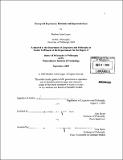| dc.contributor.advisor | Alex Byrne. | en_US |
| dc.contributor.author | Logue, Heather, 1979- | en_US |
| dc.contributor.other | Massachusetts Institute of Technology. Dept. of Linguistics and Philosophy. | en_US |
| dc.date.accessioned | 2010-05-25T20:58:42Z | |
| dc.date.available | 2010-05-25T20:58:42Z | |
| dc.date.copyright | 2009 | en_US |
| dc.date.issued | 2009 | en_US |
| dc.identifier.uri | http://hdl.handle.net/1721.1/55181 | |
| dc.description | Thesis (Ph. D.)--Massachusetts Institute of Technology, Dept. of Linguistics and Philosophy, 2009. | en_US |
| dc.description | Cataloged from PDF version of thesis. | en_US |
| dc.description | Includes bibliographical references (p. 112-116). | en_US |
| dc.description.abstract | The aim of this dissertation is to elaborate and assess the Relational View of perceptual experience, and to compare it to its main rival, the Representational View. Roughly stated, the core claim of the Relational View is that veridical perceptual experience is basically a matter of perceiving material entities in one's environment. By contrast, the Representational View holds that all kinds of perceptual experience consist in a propositional attitude-i.e., in representing a proposition to the effect that one's environment is a certain way. In Chapter 1, I attempt to improve upon previous articulations of the Relational View's account of veridical experience by way of contrasting it with the Representational View. I then turn to the Relational View's account of non-veridical perceptual experience (i.e., illusions and hallucinations), and I argue that the most plausible account is a version of disjunctivism-roughly, a view on which veridical and at least hallucinatory experiences are fundamentally different. Finally, I outline and assess the main motivations that have been offered for the Relational View. In Chapter 2, I consider existing objections to the Relational View, and I argue that several of them are misguided. An objection that isn't misguided, however, is the worry that the Relational View cannot give plausible accounts of non-veridical perceptual experiences. I argue that this objection is not (yet) fatal to the Relational View on the grounds that certain Relationalist accounts of illusions and hallucinations have been under-explored, and I conclude Chapter 2 by elaborating and defending them. | en_US |
| dc.description.abstract | (cont.) Finally, in Chapter 3, I develop a novel objection to the Relational View. The Relational View has been criticized for the difficulties it faces in giving plausible accounts of non-veridical experiences, but it is usually taken for granted that it offers a plausible account of veridical experience. I argue that any theory of perceptual experience should be able to accommodate the role perceptual experience plays in explaining belief. I consider four kinds of ways in which the Relationalist might attempt to accommodate this role in the case of veridical experience, and I argue that the only viable ones require weighty metaphysical commitments. I conclude that if the Relationalist cannot defend these commitments, we should endorse the Representational View. | en_US |
| dc.description.statementofresponsibility | by Heather Anne Logue. | en_US |
| dc.format.extent | 116 p. | en_US |
| dc.language.iso | eng | en_US |
| dc.publisher | Massachusetts Institute of Technology | en_US |
| dc.rights | M.I.T. theses are protected by
copyright. They may be viewed from this source for any purpose, but
reproduction or distribution in any format is prohibited without written
permission. See provided URL for inquiries about permission. | en_US |
| dc.rights.uri | http://dspace.mit.edu/handle/1721.1/7582 | en_US |
| dc.subject | Linguistics and Philosophy. | en_US |
| dc.title | Perceptual experience : relations and representations/ | en_US |
| dc.type | Thesis | en_US |
| dc.description.degree | Ph.D. | en_US |
| dc.contributor.department | Massachusetts Institute of Technology. Department of Linguistics and Philosophy | |
| dc.identifier.oclc | 608238871 | en_US |
